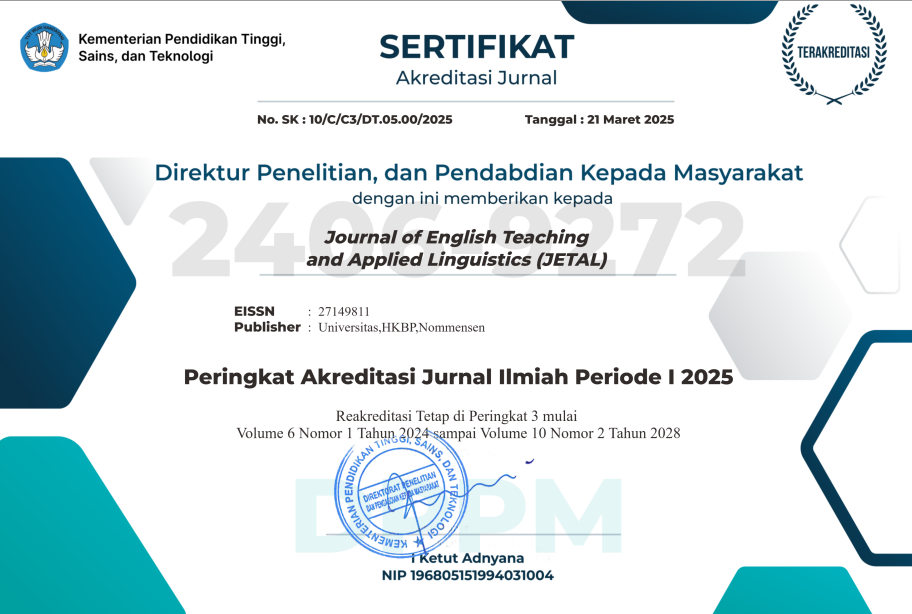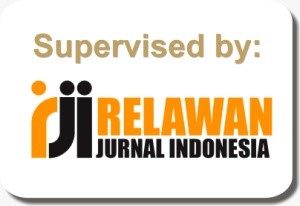Empowering E-Learning for English Literacy Development: Insights from Lecturers
Abstract
The integration of e-learning platforms in university settings has experienced notable growth, especially with the onset of the COVID-19 pandemic. This qualitative case study explored university lecturers' perceptions regarding the use of e-learning for teaching English literacy skills, specifically reading and writing. Semi-structured interviews were utilized for data collection with six lecturers from the English Department at Universitas Sulawesi Barat, Indonesia, who taught literacy courses during the 2022/2023 academic year. The findings revealed a spectrum of lecturers' experiences, beliefs, and attitudes toward e-learning-based literacy instruction. While initial challenges were encountered during the transition to online learning, the lecturers recognized benefits such as flexibility, efficient material sharing, and enabling remote assignments. However, connectivity issues, difficulties monitoring student progress, and the need for robust technological skills were identified as significant challenges. The lecturers advocated learner-centered, multimodal pedagogical approaches and emphasized the importance of balanced, blended learning that integrates both traditional classroom and online elements. The study highlights the potential of e-learning for enhancing English literacy education while underscoring the need to address infrastructural and pedagogical barriers.
References
Afidah, N., Hanifah, & Alkhoyyath, D. (2021). Developing e-learning media in grammar instruction for beginner learners. JEES (Journal of English Educators Society), 6(1), 139–146. https://doi.org/10.21070/jees.v6i1.363
Alieto, E., Abequibel-Encarnacion, B., Estigoy, E., Balasa, K., Eijansantos, A., & Torres-Toukoumidis, A. (2024). Teaching inside a digital classroom: A quantitative analysis of attitude, technological competence and access among teachers across subject disciplines. Heliyon, 10(2), e24282. https://doi.org/10.1016/j.heliyon.2024.e24282
Braun, V., & Clarke, V. (2006). Using thematic analysis in psychology. Qualitative Research in Psychology, 3(2), 77–101. https://doi.org/10.1191/1478088706qp063oa
Elekaei, A., Tabrizi, H. H., & Chalak, A. (2020). Evaluating learners’ vocabulary gain and retention in an e-learning context using vocabulary podcasting tasks: A case study. Turkish Online Journal of Distance Education, 21(2), 190–203. https://doi.org/10.17718/TOJDE.728162
Eli-Chukwu, N. C., Igbokwe, I. C., Ifebude, B., Nmadu, D., Iguodala, W., Uma, U., Onyeneke, R. U., & Akudo, F. U. (2023). Challenges confronting e-learning in higher education institutions in Nigeria amid Covid -19. Journal of Applied Research in Higher Education, 15(1), 238–253. https://doi.org/10.1108/JARHE-09-2021-0346
Huda, M. (2024). Between accessibility and adaptability of digital platform: investigating learners’ perspectives on digital learning infrastructure. Higher Education, Skills and Work-Based Learning, 14(1), 1–21. https://doi.org/10.1108/HESWBL-03-2022-0069
Inan, F. A., & Bolliger, D. U. (2023). Online instructors’ pedagogical beliefs and choice of student learning activities. Educational Technology Research and Development. https://doi.org/10.1007/s11423-023-10331-z
Isma, A. (2023a). Enhancing digital literacies with adult English language learners: Theoretical and practical insights. TESOL Journal. https://doi.org/10.1002/tesj.752
Isma, A. (2023b). Emerging Trends of ICT in Teaching and Learning: ICT in English Language Teaching [Book Review]. LLT Journal: A Journal on Language and Language Teaching, 26(2), 812–815. https://doi.org/10.24071/llt.v26i2.6172
Isma, A., Abdullah, A., & Baharuddin, A. F. (2022). Non-English language students’ perceptions in learning English through online Quizizz application. International Seminar on Language, Education, and Culture (ISoLEC), 1–12.
Isma, A., Hermansyah, S., Ramadhani, Y. R., Lestari, I. W., Evenddy, S. S., Talenta, P. I., Sastri, L., Rasmin, L. O., Febrianto, A. R., & Pavita, M. D. A. (2023). Teaching English to 21st Century Learners (1st ed.). Yayasan Kita Menulis.
Isma, A., Lestari, I. W., Halim, A., Halim, N. M., Sastri, L., Ramadhani, Y. R., Sari, I. M., Simarmata, J., Ritnawati, & Nurlely, L. (2024). Innovative Approaches to Teaching English: Exploring the Power of Technology (1st ed.). Yayasan Kita Menulis.
Koh, J. H. L., & Kan, R. Y. P. (2021). Students’ use of learning management systems and desired e-learning experiences: are they ready for next generation digital learning environments? Higher Education Research & Development, 40(5), 995–1010. https://doi.org/10.1080/07294360.2020.1799949
Lestari, I. W., & Isma, A. (2019). Using Translation Activity to Improve the Students’ Vocabulary Mastery of the Eleventh Grade of Social Class at SMAN 3 Bojonegoro. IDEAS: Journal on English Language Teaching and Learning, Linguistics and Literature, 7(2), 185–197. https://doi.org/10.24256/ideas.v7i2.1034
Liu, Z.-Y., Lomovtseva, N., & Korobeynikova, E. (2020). Online learning platforms: Reconstructing modern higher education. International Journal of Emerging Technologies in Learning (IJET), 15(13), 4–21.
Lukas, B. A., & Yunus, M. M. (2021). ESL teachers’ challenges in implementing e-learning during COVID-19. International Journal of Learning, Teaching and Educational Research, 20(2), 330–348. https://doi.org/10.26803/IJLTER.20.2.18
Malkawi, N., Rababah, M., Al Dalaeen, I., Ta’amneh, I., El Omari, A., Alkhaldi, A. A., & Rabab’ah, K. (2023). Impediments of Using E-Learning Platforms for Teaching English: A Case Study in Jordan. International Journal of Emerging Technologies in Learning, 18(5), 95–113. https://doi.org/10.3991/ijet.v18i05.36727
Merriam, S. B., & Tisdell, E. J. (2015). Qualitative Research: A Guide to Design and Implementation. John Wiley & Sons.
Patra, I., Hashim Alghazali, T. A., Sokolova, E. G., Prasad, K. D. V, Pallathadka, H., Hussein, R. A., Shanan, A. J., & Ghaneiarani, S. (2022). Scrutinizing the Effects of e-Learning on Enhancing EFL Learners’ Reading Comprehension and Reading Motivation. Education Research International, 2022, 4481453. https://doi.org/10.1155/2022/4481453
Qamarya, N., Djollong, A. F., Mukaromah, S., Widayati, E., Isma, A., Adawiyah, R., Ainiyah, K., Zakaria, Effendi, H., Pratiwi, R. H., Maryati, I., Priyambodo, S., Zahraa, F. El, & Siswanto, E. (2023). Model Pembelajaran (1st ed.). CV. Eureka Media Aksara.
Rahayu, S., Rahmadani, E., Syafitri, E., Prasetyoningsih, L., Ubaidillah, M. F., & Tavakoli, M. (2022). Teaching with Technology during COVID-19 Pandemic: An Interview Study with Teachers in Indonesia. Education Research International, null, null. https://doi.org/10.1155/2022/7853310
Sariani, Khairat, M. El, & Yaningsih. (2021). An optimization of language learning in writing through e-learning: Encountering covid-19 pandemic. International Journal of Language Education, 5(1), 528–541. https://doi.org/10.26858/IJOLE.V5I1.15375
Yin, R. K. (2018). Case study research and applications: Design and methods. SAGE Publication, Inc. https://doi.org/10.1177/109634809702100108
Zarei, S., & Mohammadi, S. (2022). Challenges of higher education related to e-learning in developing countries during COVID-19 spread: a review of the perspectives of students, instructors, policymakers, and ICT experts. Environmental Science and Pollution Research, 29(57), 85562–85568. https://doi.org/10.1007/s11356-021-14647-2

This work is licensed under a Creative Commons Attribution-ShareAlike 4.0 International License.
Authors retain copyright and grant the journal right of first publication with the work simultaneously licensed under a Creative Commons Attribution-ShareAlike 4.0 International License (CC BY-SA 4.0) that allows others to share the work with an acknowledgment of the work's authorship and initial publication in this journal.
Authors are able to enter into separate, additional contractual arrangements for the non-exclusive distribution of the journal's published version of the work (e.g., post it to an institutional repository or publish it in a book), with an acknowledgment of its initial publication in this journal.
Authors are permitted and encouraged to post their work online (e.g., in institutional repositories or on their website) prior to and during the submission process, as it can lead to productive exchanges, as well as earlier and greater citation of published work (See The Effect of Open Access).






